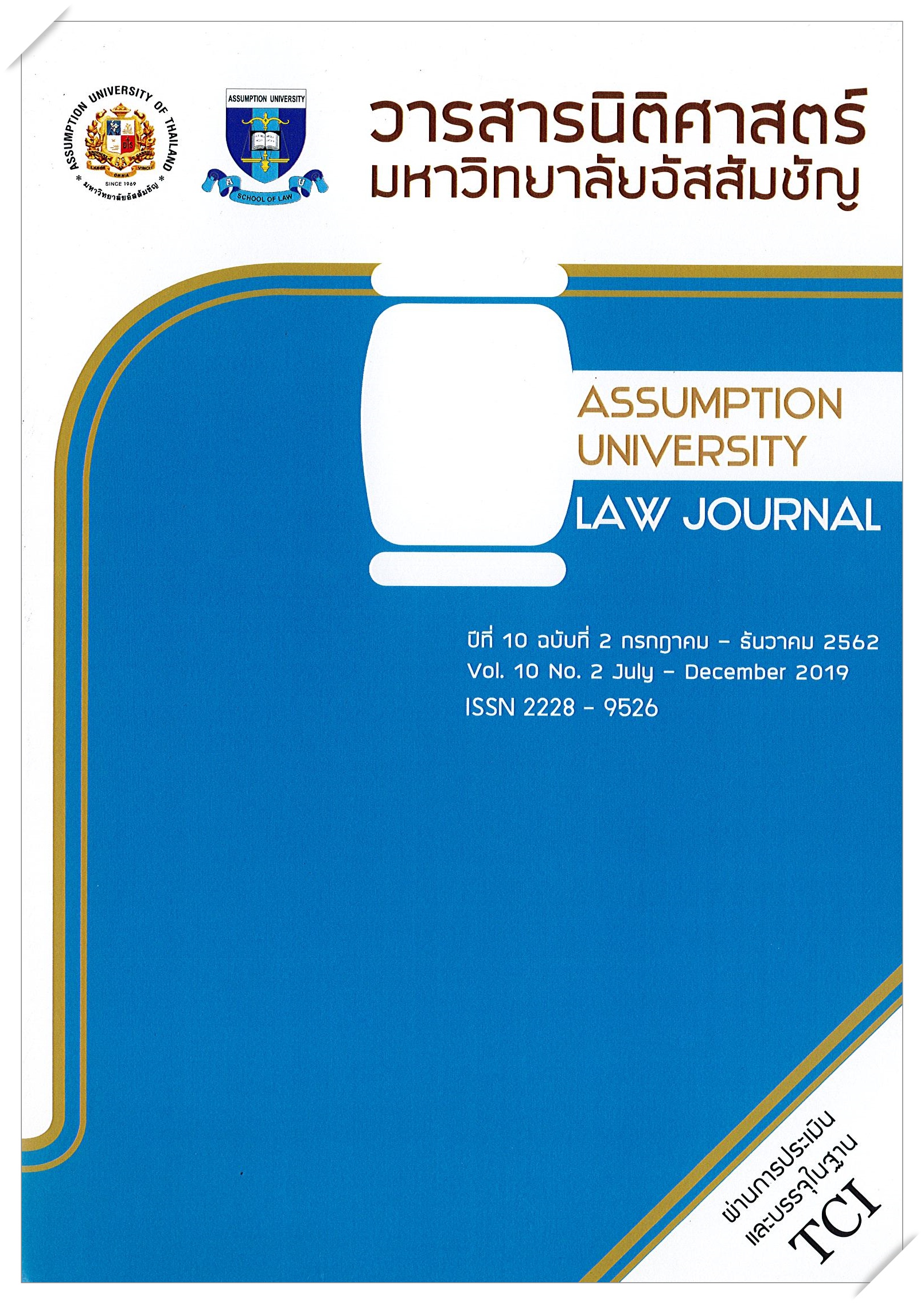แนวทางศึกษาเปรียบเทียบมาตรการลงโทษทางอาญาฐานโจรกรรมเอกลักษณ์บุคคลระหว่างประเทศไทยกับสหรัฐอเมริกา <br>A comparative study of criminal punishment of identity theft in Thailand and the United States
Keywords:
การโจรกรรมเอกลักษณ์บุคคล, ข้อมูลเอกลักษณ์บุคคล, ผู้ดูแลข้อมูล, Identity theft, personal identification information, data collectorAbstract
บทคัดย่อ
การโจรกรรมเอกลักษณ์บุคคล (Identity Theft) คือการที่ข้อมูลเอกลักษณ์บุคคลถูกนำไปใช้โดยที่ไม่ได้รับความยินยอมจากเจ้าของข้อมูลนั้นและเพื่อแสวงหาประโยชน์อย่างผิดกฎหมายทั้งนี้การโจรกรรมเอกลักษณ์บุคคลเป็นอาชญากรรมที่แพร่หลายเป็นอย่างมากไม่เฉพาะในประเทศพัฒนาแล้วอย่างสหรัฐอเมริกาหากแต่เกิดขึ้นทั่วโลกและยังเป็นการกระทาความผิดที่ส่งผลกระทบในวงกว้างไม่เฉพาะแต่ตัวเหยื่อผู้เสียหายเท่านั้นแต่ยังส่งผลกระทบต่อความมั่นคงของประเทศทั้งทางด้านเศรษฐกิจสังคมและความสัมพันธ์ระหว่างประเทศอีกด้วยการกระทาดังกล่าวทาให้เหยื่อได้รับความเสียหายทั้งทางด้านร่างกาย จิตใจชื่อเสียงทรัพย์สินเวลาและยังเป็นความผิดที่ยากต่อการฟ้องร้องดาเนินคดีกับผู้โจรกรรมเอกลักษณ์บุคคลเพราะโดยส่วนมากจะระบุตัวตนที่แท้จริงของผู้โจรกรรมข้อมูลไม่ได้แม้ว่าจะสามารถระบุได้ว่าใครคือผู้โจรกรรมข้อมูลที่แท้จริงแต่ที่อยู่ของผู้โจรกรรมข้อมูลขณะที่มีการกระทาความผิดอาจเป็นที่อยู่ปลอมหรืออาจก่อเหตุในต่างประเทศก็เป็นได้นอกเหนือจากที่ผู้เสียหายจะดาเนินคดีอาญากับผู้โจรกรรมข้อมูลได้แล้วผู้เสียหายสามารถที่จะฟ้องผู้เก็บรักษาข้อมูลเอกลักษณ์บุคคลจากความประมาทเลินเล่อที่เกิดขึ้นจากมูลละเมิดกล่าวคือผู้เก็บรักษาข้อมูลไม่ปฏิบัติตามหลักมาตรฐานทางการค้า“reasonable commercial standards”นอกจากนี้ความผิดที่เกิดขึ้นโดยส่วนมากมักมีสาเหตุมาจากพนักงานขององค์กรนั้นๆ เพราะเป็นบุคคลที่เข้าถึงข้อมูลเอกลักษณ์ของเหยื่อได้ง่ายผู้เสียหายควรดาเนินคดีกับองค์กรและลูกจ้างเพราะผู้เก็บรักษาข้อมูลจะต้องเป็นผู้รับผิดชอบร่วมกับลูกจ้างจากหลัก “the doctrines of agency and respondent superior” ในบทความชิ้นนี้เป็นการศึกษาความหมายและวิธีการในการโจรกรรมเอกลักษณ์บุคคลความรับผิดทางอาญาของผู้โจรกรรมผู้สนับสนุนและผู้ดูแลรักษาข้อมูลในส่วนแพ่งบทความชิ้นนี้ยังเปรียบเทียบกฎหมายและคาพิพากษาระหว่างประเทศไทยกับสหรัฐอเมริกาในส่วนที่เกี่ยวข้องกับการโจรกรรมเอกลักษณ์บุคคลพร้อมนาเสนอข้อสรุปและข้อเสนอแนะตามลาดับ
Abstract
Identity theft involves stealing personal identification information belonging to another, with the intent and for the purpose of fraudulently using that information to gain money, goods, services, or other economic or private benefit realized by the identity thief and any co-conspirators. Identity theft is one of the most prevalent crimes in recent years, not only in developed countries like the United States, but throughout the world. It is an offense that not only has a huge impact on the victim, but also affects national security, and the economy, social and international relations. Identity theft causes victims to suffer physical, financial, emotional, and reputational harm. It is difficult to prosecute the perpe-trators and accomplices involved in this crime because it hard to determine the identity of the thief who can be pose as almost anyone. Even if the true identity of the perpetrator is established the current location of the data may remain unknown because the theft may take place in a foreign country. Alternatively, victim may pursue a claim for compensation from the company or organization that collected the identifying data because that organi-zation failed to comply with reasonable commercial standards to maintain the security of the data. The most common form of identity theft is committed by employees of busi-nesses or organizations that possess such data. The victim should prosecute both the or-ganization and employees because organizations in possession of identifying data are re-sponsible for the actions of their employees under the doctrines of agency and respondent superior. This article will study the meaning and methods of identity theft and the liability of the perpetrators, co-conspirators and data collectors. This article also compares the laws and judgments of Thailand and the United States, and presents conclusions and suggestions.
Downloads
Published
Issue
Section
License
- บทความทุกเรื่องได้รับการตรวจทางวิชาการโดยผู้ทรงคุณวุฒิ (Reader) จากภายในและนอกมหาวิทยาลัย
- ความคิดเห็นใดๆ ที่ลงตีพิมพ์ในวารสารกฎหมายคณะนิติศาสตร์ มหาวิทยาลัยอัสสัมชัญ เป็นของผู้เขียน (ความคิดเห็นใดๆ ของผู้เขียน กองบรรณาธิการวารสารกฎหมายคณะนิติศาสตร์ มหาวิทยาลัยอัสสัมชัญไม่จำเป็นต้องเห็นด้วย)
- กองบรรณาธิการวารสารกฎหมายคณะนิติศาสตร์ มหาวิทยาลัยอัสสัมชัญ ไม่สงวนสิทธิในการคัดลอก แต่ให้อ้างอิงแสดงแหล่งที่มาด้วย


